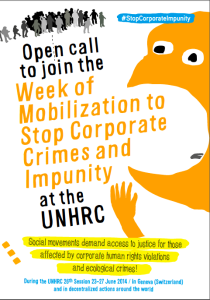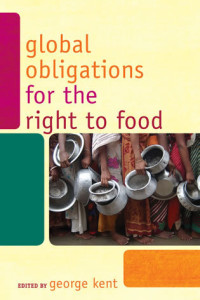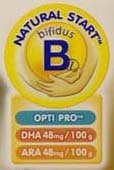 Baby Milk Action press release 10 June 2014
Baby Milk Action press release 10 June 2014
Baby Milk Action is today joining colleagues around the world calling on governments to support international efforts to strengthen international law, thereby better protecting people from human rights abuses caused by corporate activities.
Organisations and individuals can view the statement and sign up here.
In June this year, countries from around the world will come together in Geneva for the 26th Session of the Human Rights Council (10 – 27 June 2014). At this session some countries will be calling for the UN to begin developing an international treaty on business and human rights. These calls are part of an international Treaty Alliance formed to prevent corporate human rights abuses. This Alliance is calling for a treaty that would have countries monitor and regulate corporations under their control, provide access to justice and accountability for those impacted by corporate human rights abuses, as well as develop an international mechanism that can, when needed, hold corporations accountable outside the national court system.
Mike Brady, Campaigns Coordinator at Baby Milk Action, said (full statement):
Corporations are becoming ever more economically and politically powerful and governments are not keeping up. Indeed, sometimes governments are being co-opted by executives to protect corporate interests. We need collective action to ensure business operates under a set of rules agreed by governments through a democratic and transparent process, to protect our rights. Human rights should come before corporate interests.
Baby Milk Action has demonstrated that non-binding initiatives such as the UN Global Compact and the OECD Guidelines for Multinational Enterprises are ineffective. It has been pursuing complaints regarding Nestlé’s systematic abuses of human rights in the way it markets its baby milks for five years. The UN Global Compact is promoted as an alternative to regulation, but posts reports from companies on its website without any checking and has not investigated allegations of egregious violations of the Global Compact Principles when reported by Baby Milk Action. Rather than taking the action set out in the Global Compact Integrity Measures to review Nestlé’s inclusion on its website, the Global Compact Office has taken part in joint events with Nestlé and accepted it as a Patron Sponsor.
 Baby Milk Action was a member of the UN System Standing Committee on Nutrition Task Force on Global Obligations for the Right to Food. In the book produced by the Task Force, it highlighted that under existing human rights norms nation states have a responsibility to take collective action to hold corporations accountable for abuses of human rights and environmental standards. It proposed various methods by which this could be achieved through existing or new international institutions, as well as approaches to compel national governments to hold their corporations to account for their practices anywhere in the world.
Baby Milk Action was a member of the UN System Standing Committee on Nutrition Task Force on Global Obligations for the Right to Food. In the book produced by the Task Force, it highlighted that under existing human rights norms nation states have a responsibility to take collective action to hold corporations accountable for abuses of human rights and environmental standards. It proposed various methods by which this could be achieved through existing or new international institutions, as well as approaches to compel national governments to hold their corporations to account for their practices anywhere in the world.
As part of the International Baby Food Action Network (IBFAN), Baby Milk Action has over 30 years of experience in monitoring corporations against marketing standards adopted through the UN system: the International Code of Marketing of Breastmilk Substitutes and subsequent, relevant Resolutions of the World Health Assembly. There is no binding mechanism at the global level to hold corporations accountable for violating these measures.
Mike Brady said:
Parents have the right to accurate, independent information, however they decide to feed their children. This should be from health workers who maintain their independence from companies with a vested interest in selling products. Babies fed on breastmilk substitutes are more likely to become sick than breastfed babies and, in conditions of poverty, are more likely to die. Those who use breastmilk substitutes have a right to accurate information on reducing risks. Globally, 800,000 under-5 deaths could be prevented every year through improved breastfeeding.
IBFAN has had some success in advocating national implementation of the International Code and Resolutions. Today over 70 countries have legislation implementing most or many of the provisions of the Code and Resolutions. The most recent global monitoring report, Breaking the Rules, Stretching the Rules 2014, profiles 27 baby milk and feeding bottle companies.
 Questioned on the findings of systematic violations by Baby Milk Action at the Nestlé shareholder meeting on 10 April 2014, the response from the Nestlé Executive Board was that 90% of the violations are in line with Nestlé’s policies, demonstrating both the company’s failure to bring these into line with the requirements and the intention of executives to continue with practices that mislead parents and put babies at risk.
Questioned on the findings of systematic violations by Baby Milk Action at the Nestlé shareholder meeting on 10 April 2014, the response from the Nestlé Executive Board was that 90% of the violations are in line with Nestlé’s policies, demonstrating both the company’s failure to bring these into line with the requirements and the intention of executives to continue with practices that mislead parents and put babies at risk.
Left: Nestlé defends promoting its formula with claims it is the ‘natural start’, the ‘gentle start’ and ‘protects’ babies. See poster with other examples.
Mike Brady said:
The International Code requires companies to ensure their practices at every level comply with its provisions independently of any other measures. However, most ignore this as a matter of policy, stating they follow national implementation, and then work to weaken national measures. At present, there are only civil society campaigns such as the Nestlé boycott and DanoNO campaigns to hold these companies to account when governments fail to do so. An international mechanism is long overdue.
Contact: Mike Brady at info@babymilkaction.org
